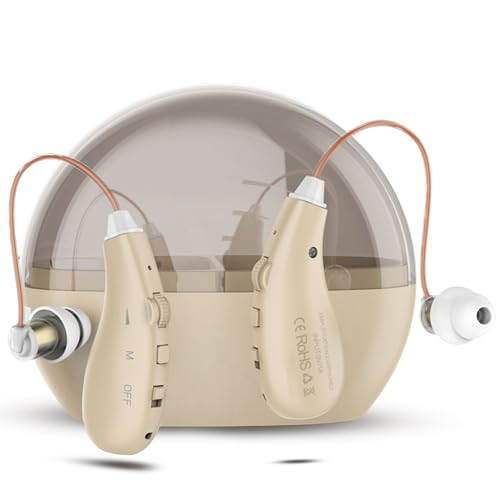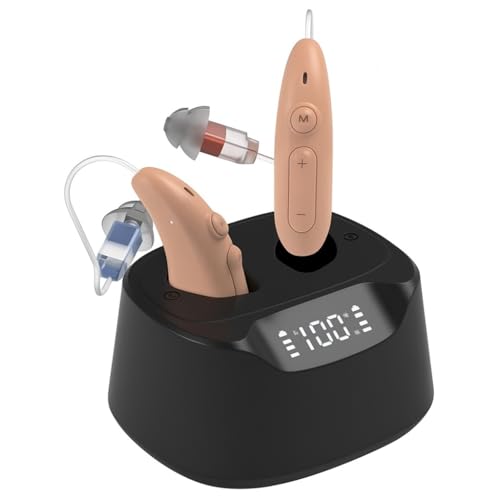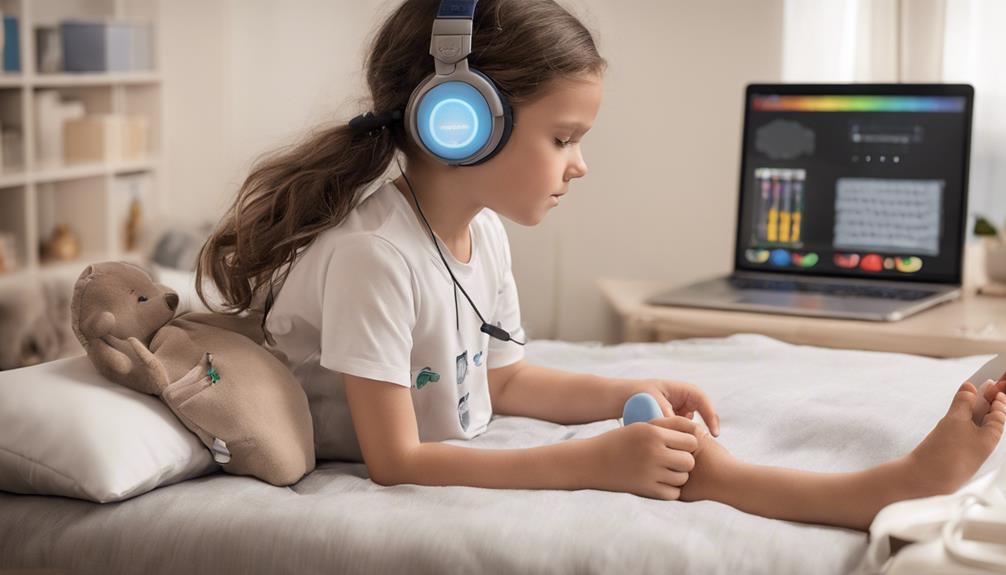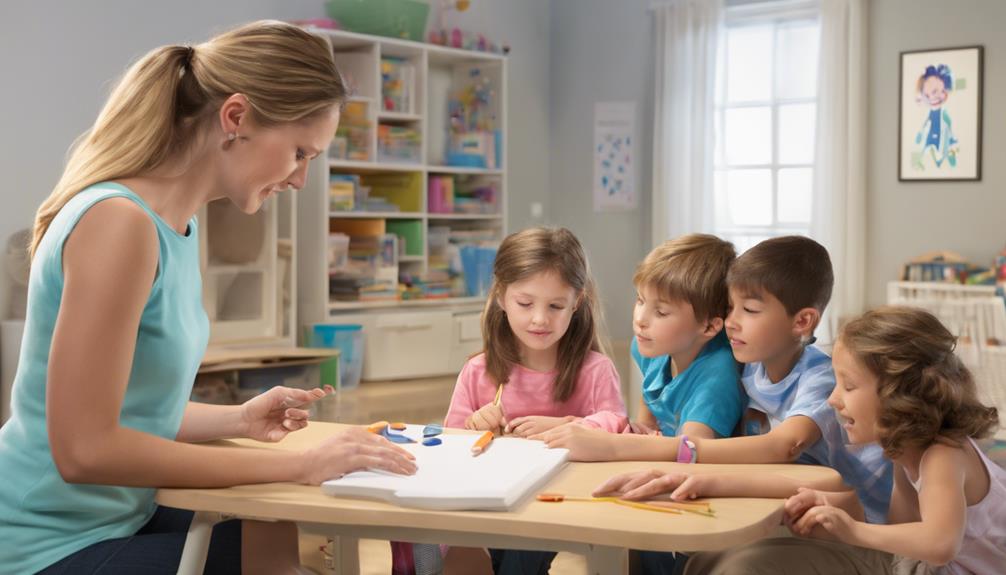Imagine stepping into a world where sounds come alive, guiding individuals on a journey of auditory and verbal discovery.
As we explore the realm of Interactive Auditory Verbal Therapy Activities, we uncover a treasure trove of engaging tools designed to enhance communication skills.
From captivating listening activities to interactive sound discrimination exercises, this collection offers a myriad of opportunities to support individuals in their learning journey.
Join us as we unravel the possibilities and unlock the potential for transformative growth in auditory comprehension and verbal expression.
Key Takeaways
- Enhance auditory processing skills through engaging listening activities.
- Develop communication proficiency with structured language exercises.
- Improve speech sound production and articulation through targeted practice.
- Foster cognitive and language development with interactive games and tasks.

WASOCA Hearing Aids for Seniors, Hearing Aids Rechargeable with Bluetooth, Hearing Aid APP Control, Hearing Amplifier for The Hearing Loss, Hearing Your Voice, FSA&HSA Eligible
Hearing Aid & Bluetooth 2 in 1 : Hearing aids realize hearing aid and Bluetooth function 2 in...
As an affiliate, we earn on qualifying purchases.
Engaging Listening Activities
Engaging in active listening activities forms a crucial component of auditory verbal therapy for children with hearing impairment. The Auditory Verbal Therapy Activities Collection offers a variety of interactive tasks and games specifically designed to enhance listening skills, verbal expression, and auditory comprehension in children facing hearing challenges. These activities are carefully curated to not only make therapy sessions enjoyable but also highly effective in supporting the development of essential communication skills.
Within this collection, there are diverse exercises tailored for different learning styles and levels of auditory processing difficulties. By engaging children in these auditory verbal activities, therapists, educators, and parents can create an immersive learning experience that promotes language development and communication proficiency. These activities are particularly beneficial in early intervention programs, speech therapy sessions, and oral communication settings where the focus is on maximizing the child's potential for auditory learning and spoken language acquisition.

Banglijian Rechargeable Hearing Aid for Moderate to Severe Hearing Loss Ziv-206 for Seniors Adults with Noise Reduction Adaptive Feedback Cancellation-Two Types of Sound Tubes(Two Units)
EASY USE AND COMFORTABLE FEATURE: Banglijian is a professional hearing aid manufacturer and seller, which have produced a...
As an affiliate, we earn on qualifying purchases.
Interactive Sound Discrimination Exercises

Utilizing interactive sound discrimination exercises is essential for enhancing auditory processing skills in children with hearing impairments. These activities play a crucial role in speech therapy by helping children identify and differentiate between various sounds. Whether used in early intervention programs, special education settings, or regular speech therapy sessions, sound discrimination exercises contribute to improving phonemic awareness and listening skills.
By engaging in interactive tasks that involve distinguishing between sounds, children not only refine their auditory processing abilities but also make learning about sound discrimination more enjoyable and effective. Through these exercises, children with hearing impairments can develop a better understanding of speech sounds, leading to enhanced communication skills and overall language development.
Incorporating interactive sound discrimination exercises into speech therapy sessions provides a hands-on approach to improving auditory skills and is a valuable tool in helping children reach their full communication potential.

Soundure Hearing Aids for Seniors, OTC Hearing Aids for People with severe Hearing Loss, Smart Noise Reduction Chips, Stand for 80h, One-Button Operation, Comfortable Wearing
Clearer Conversations in Daily Life: These hearing aids use digital noise reduction technology to make voices sound clearer...
As an affiliate, we earn on qualifying purchases.
Communication Skills Building Worksheets
Let's start by highlighting the key points of our discussion on communication skills building worksheets.
These worksheets offer exercises to expand vocabulary, practice pronunciation, and improve listening comprehension.
They're essential tools for enhancing various aspects of communication and language development.
Vocabulary Expansion Exercises
Incorporating vocabulary expansion exercises into auditory verbal therapy sessions can significantly enhance communication skills development. The resources provided in the PDF collection focus on building vocabulary acquisition and usage for individuals in auditory verbal therapy. These exercises offer structured and engaging opportunities for practicing and expanding vocabulary, ultimately improving verbal expression, comprehension, and overall communication abilities. Tailored to different proficiency levels and communication needs, users can expect a variety of activities within the auditory verbal therapy context.
| Vocabulary Expansion Exercises |
|---|
| 1. Word Association Games |
| 2. Synonym and Antonym Practice |
| 3. Contextual Vocabulary Building |
| 4. Storytelling with New Words |
| 5. Vocabulary Quizzes |
Pronunciation Practice Sheets
We enhance communication skills by utilizing Pronunciation Practice Sheets, designed for targeted exercises to improve speech clarity and articulation. These worksheets offer structured activities focused on specific sounds or phonemes, aiding in refining pronunciation skills. They're valuable tools in speech therapy sessions or for independent practice at home, aiming to strengthen articulation and phonological skills for clearer verbal expression.
Pronunciation Practice Sheets provide a systematic approach to practicing and perfecting pronunciation, making them ideal for individuals seeking to enhance their communication abilities. Incorporating these educational games into therapy or daily practice routines can significantly benefit individuals looking to improve their speech clarity and overall communication skills.
Listening Comprehension Activities
Listening Comprehension Activities are essential tools for enhancing communication skills through engaging worksheets designed to improve auditory processing, verbal reasoning, and comprehension abilities.
These activities provide structured practice for listening and understanding spoken language, targeting various aspects of listening comprehension such as following directions, sequencing, and inferencing.
The worksheets offer individuals receiving Auditory Verbal Therapy (AVT) or working on communication skills a valuable resource to hone their listening abilities effectively.
By engaging in these listening comprehension activities, individuals can develop crucial skills that are fundamental for effective communication and interaction.
The focus on auditory processing and comprehension in these activities helps individuals strengthen their ability to comprehend and respond appropriately in various communication settings.

B501 Professional Hearing Aids for Severe Hearing Loss Seniors- 45dB Gain & 16-Channel Precision, Anti-Whistling Tech, 50H Battery with Charging Case, Self-Fitting Discreet Design
45dB Broadband Response for Severe Hearing Loss. Customized gain amplification up to 45dB covers even profound hearing loss,...
As an affiliate, we earn on qualifying purchases.
Auditory Memory Enhancement Tasks

Enhancing auditory memory involves engaging in tasks that focus on improving the ability to recall auditory information through active participation in varied and interactive activities. These tasks typically involve listening to and remembering sequences of sounds, words, or sentences. By participating in auditory memory enhancement activities, individuals can strengthen their auditory processing skills and working memory capacity. This is particularly beneficial for individuals with language processing difficulties and learning disabilities.
Engaging in varied and interactive auditory memory tasks can be advantageous for both children and adults in honing their auditory memory skills. These activities not only enhance the ability to retain auditory information but also promote cognitive development and language comprehension. Through consistent practice of auditory memory enhancement tasks, individuals can experience improvements in their overall auditory processing abilities, leading to enhanced communication skills and academic performance.
Speech Sound Practice Sheets

We'll now introduce the key points related to the Speech Sound Practice Sheets in the Interactive Auditory Verbal Therapy Activities PDF Collection.
These sheets encompass sound practice techniques designed to target specific speech sounds and phonemes for individuals with speech disorders or delays.
Sound Practice Techniques
How can targeted auditory verbal therapy activities, such as the Speech Sound Practice Sheets, contribute to improving speech sound production and auditory discrimination skills?
- Focused Practice: The Speech Sound Practice Sheets offer structured exercises to target specific speech sounds, aiding in accurate production.
- Interactive Learning: These activities are designed to be engaging, encouraging active participation and enhancing auditory discrimination skills.
- Skill Development: By providing practice opportunities that focus on speech sound production and auditory discrimination, individuals can work towards improving their overall communication abilities.
Engaging in these Sound Practice Techniques can be instrumental in honing speech sound production and auditory discrimination skills, leading to enhanced verbal expression and communication proficiency.
Targeted Speech Exercises
The Targeted Speech Exercises PDF collection comprises speech sound practice sheets meticulously crafted to enhance articulation and phonological skills. These speech sound practice sheets are specifically designed for auditory verbal therapy activities, focusing on improving articulation and phonological abilities.
Tailored for children in early intervention, speech therapy, and oral communication settings, each practice sheet offers structured exercises to target individual speech sounds effectively. By providing a variety of activities, this collection aims to enhance auditory processing and verbal expression skills within a therapeutic environment.
These exercises offer a systematic approach to speech sound practice, supporting therapists and individuals in achieving targeted goals for improved communication abilities.
Effective Sound Repetition
Utilizing targeted repetition of specific speech sounds, the Effective Sound Repetition practice sheets serve as a valuable resource for individuals seeking to enhance articulation skills and improve speech clarity. These activities focus on repetitive practice of particular phonemes to ensure accuracy and clarity in speech production.
The practice sheets offer a structured approach to target various speech sounds, allowing for customization to address specific therapy goals. Whether used in therapy sessions or at home, these resources provide engaging exercises for both children and adults working on speech sound production.
Following Directions Games

Engage students in auditory verbal therapy sessions with interactive Following Directions Games that aim to enhance listening skills and comprehension. These games are specifically designed to target auditory processing, memory, and attention skills while providing an enjoyable learning experience. By offering various levels of difficulty, they cater to different abilities and ensure continuous progress in auditory verbal therapy.
| Game Name | Description |
|---|---|
| Simon Says | Classic game requiring precise execution of instructions. |
| Treasure Hunt | Follow clues to find hidden treasures, practicing listening and problem-solving skills. |
| Musical Chairs | Enhances listening abilities by following directions to secure a seat when the music stops. |
These games provide a structured platform for students to practice following directions in a supportive and engaging environment, leading to improved skills and increased confidence. Incorporating these activities into therapy sessions fosters skill development in a stimulating way, promoting active participation and growth in auditory processing abilities.
Phonemic Awareness Tasks

In developing strong literacy skills, we focus on enhancing phonemic awareness through tasks that involve hearing, identifying, and manipulating individual sounds in spoken language. Phonemic awareness tasks are crucial for early reading success, especially in young children.
Here are some examples of phonemic awareness tasks that can aid in literacy development:
- Identifying Sounds: Encourage young children to identify initial, medial, and final sounds in words. This helps them understand the relationship between sounds and letters.
- Blending Sounds: Practice blending sounds together to form words. This activity strengthens the ability to combine individual sounds into meaningful words.
- Segmenting Words: Help children segment words into individual sounds. This task enhances their phonological processing skills, making it easier to decode written words.
Engaging in these phonemic awareness activities can support speech and language development, improve phonological processing, and enhance overall reading proficiency in young children.
Vocabulary Expansion Activities

To build upon the foundational phonemic awareness tasks previously discussed, our focus now shifts towards vocabulary expansion activities designed to enhance auditory comprehension and verbal expression skills. These activities aim to strengthen vocabulary through interactive and engaging exercises, catering to various age groups and skill levels. By exploring a range of vocabulary concepts and themes, individuals can improve language processing, critical thinking, and communication skills in a fun and interactive manner. The structured approach of these activities aligns with the principles of auditory verbal therapy, offering an effective way to expand vocabulary knowledge. Below is a table highlighting some vocabulary expansion activities included in the PDF collection:
| Activity Name | Target Age Group | Skill Level | Vocabulary Theme | Interactive Element |
|---|---|---|---|---|
| Word Association Game | Children | Beginner | Everyday Objects | Matching |
| Synonym Challenge | Teenagers | Intermediate | Emotions | Fill in the blanks |
| Storytelling Adventure | Adults | Advanced | Fantasy Worlds | Role-playing |
Conversation Starters and Prompts

Incorporating structured conversation starters and prompts into auditory verbal therapy sessions enhances communication and interaction skills effectively. These resources offer a range of benefits for therapy participants, aiding in the development of their verbal expression abilities. Here are some key aspects of utilizing conversation starters and prompts in therapy sessions:
- Facilitating Communication: The prompts are designed to help individuals initiate and sustain conversations, promoting improved communication skills.
- Tailored for Different Needs: The collection includes prompts suitable for various age groups and communication levels, ensuring that therapy sessions cater to diverse needs.
- Enhancing Verbal Expression: By engaging with these conversation starters, individuals can boost their language development, social skills, and overall proficiency in communication.
Frequently Asked Questions
How Can Auditory Verbal Therapy Activities Be Adapted for Different Age Groups?
When adapting auditory verbal therapy activities for various age groups, we consider developmental milestones and cognitive abilities. By adjusting the complexity, length, and themes of the activities, we can engage individuals at different stages of life effectively.
Using age-appropriate language, incorporating familiar topics, and utilizing multi-sensory materials can enhance the engagement and learning outcomes for all age groups.
Adapting activities ensures that therapy remains relevant and beneficial across diverse populations.
Are There Any Specific Tips for Incorporating Technology Into Auditory Verbal Therapy Activities?
When incorporating technology into auditory verbal therapy activities, we find that using interactive apps and online resources can enhance engagement and learning.
By utilizing platforms that offer visual cues and interactive elements, we can create a dynamic learning experience for our clients.
It's important to select tools that align with therapy goals and provide opportunities for repetition and reinforcement.
Technology can be a valuable ally in optimizing auditory verbal therapy outcomes.
How Can Parents or Caregivers Actively Participate in These Activities to Support Their Child's Progress?
We actively engage parents and caregivers in therapy to enhance their child's progress. Through regular participation in therapy sessions, parents can learn techniques for supporting their child's auditory verbal development at home.
We encourage them to practice listening and communication exercises with their child daily. By providing ongoing guidance and support, parents play a crucial role in reinforcing the skills learned during therapy sessions and promoting their child's overall progress.
What Resources or Materials Are Recommended for Creating a Stimulating Auditory Environment for Therapy Sessions?
We can enhance the auditory therapy environment by incorporating various resources like:
- Musical instruments
- Sound-producing toys
- Recorded speech or music
These materials can help create a stimulating atmosphere that engages the child's auditory senses during therapy sessions.
Are There Any Research Studies or Evidence Supporting the Effectiveness of These Auditory Verbal Therapy Activities in Improving Communication Skills?
Yes, there's research supporting the effectiveness of auditory verbal therapy activities in improving communication skills. Studies have shown that these activities can enhance speech and language development in individuals with communication disorders.
Conclusion
In conclusion, this Interactive Auditory Verbal Therapy Activities PDF Collection serves as a vibrant palette of tools to paint a path towards improved auditory and verbal communication skills.
Like a symphony of colors blending harmoniously, these activities offer a creative and engaging way to enhance listening, speaking, and comprehension abilities.
With a focus on individualized support and interactive learning, this collection is a valuable resource for speech therapy and education programs seeking to nurture communication growth effectively.










